This post was originally published in April 2022, and is being reprinted here in observation of Martin Luther King, Jr. Day 2023.
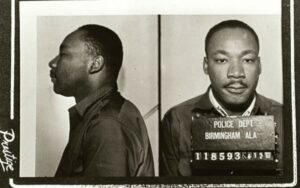 In early April 1963, the civil rights movement, led by the Southern Christian Leadership Conference (SCLC) and it’s co-founder, Martin Luther King, Jr, seemed to be stalled. Despite non-violent protests across the nation, the Kennedy Administration, which had come to power promising civil rights legislation, had seemingly turned a blind eye. They were still supportive, or so it seemed, but they weren’t doing much to fulfill their promise.
In early April 1963, the civil rights movement, led by the Southern Christian Leadership Conference (SCLC) and it’s co-founder, Martin Luther King, Jr, seemed to be stalled. Despite non-violent protests across the nation, the Kennedy Administration, which had come to power promising civil rights legislation, had seemingly turned a blind eye. They were still supportive, or so it seemed, but they weren’t doing much to fulfill their promise.
The SCLC, along with the Alabama Christian Movement for Human Rights, had planned to stage demonstrations in Birmingham, known as one of the nation’s most racist cities. But on April 10, Circuit Judge W.A. Jenkins issued an order prohibiting “parading, demonstrating, boycotting, trespassing and picketing.” Leaders of the movement quickly decided they would disobey the judge’s order, and King decided that he would put himself in position to be arrested, a move he hoped would garner the attention of President John F. Kennedy, and his brother, Attorney General Robert Kennedy.
King was arrested and spent eight days in a dark and dank Birmingham jail cell. Early in his stay, King was given a local newspaper that contained a letter written by eight white local clergymen taking King to task for his methods. In the letter, the men agreed that things needed to change. They indicated that the nation needed to treat blacks more fairly and with more respect, but they felt King and his followers needed to be more patient. They said that blacks should wait and allow the nation to come around in its own time. They blamed King and his protests for creating tension and backlash among whites, and they complained that the protests and sit-ins that King was leading were illegal.
As King read the letter in the newspaper, he began writing a response in the margins of the story. When he ran out of space in the margins, he wrote on small note pads his attorney had left behind. Finally, he was able to get his hands on a legal pad. What he wrote became known as “Letter from Birmingham Jail.” Although King’s “I Have a Dream” speech in Washington D.C. is more well known, “Letter from Birmingham Jail” may be King’s most important, most powerful work.
“Letter from Birmingham Jail” was first published on May 19, 1963 in the New York Post (after the New York Times Magazine decided against publishing it), and was subsequently published in the June issue of Liberation Magazine, the June 12, 1963 edition of The Christian Century, and the June 24, 1963 edition of The New Leader. It later was reprinted in The Progressive and The Atlantic Monthly, and was part of King’s 1964 book, Why We Can’t Wait.
Although it is long, I encourage you to read “Letter from Birmingham Jail.” It is one of the most important documents in our country’s history, and it is a classic publication on civil disobedience by a man who was being held, in essence, as a political prisoner.
Letter from Birmingham Jail
Martin Luther King Jr.
Birmingham City Jail
April 16, 1963
Bishop C.C. J. Carpenter
Bishop Joseph A. Durick
Rabbi Milton L. Grafman
Bishop Paul Harmon
The Rev. George M. Murray
The Rev. Edward V. Ramage
The Rev. Earl Stalings
My Dear Fellow Clergymen,
While confined here in the Birmingham city jail, I came across your recent statement calling our present activities “unwise and untimely.” Seldom, if ever, do I pause to answer criticism of my work and ideas. If I sought to answer all of the criticisms that cross my desk, my secretaries would be engaged in little else in the course of the day, and I would have no time for constructive work. But since I feel that you are men of genuine good will and your criticisms are sincerely set forth, I would like to answer your statement in what I hope will be patient and reasonable terms.
I think I should give the reason for my being in Birmingham, since you have been influenced by the argument of “outsiders coming in.” I have the honor of serving as president of the Southern Christian Leadership Conference, an organization operating in every Southern state, with headquarters in Atlanta, Georgia. We have some eighty-five affiliate organizations all across the South, one being the Alabama Christian Movement for Human Rights. Whenever necessary and possible, we share staff, educational and financial resources with our affiliates. Several months ago our local affiliate here in Birmingham invited us to be on call to engage in a nonviolent direct-action program if such were deemed necessary. We readily consented, and when the hour came we lived up to our promises. So I am here, along with several members of my staff, because we were invited here. I am here because I have basic organizational ties here.
Beyond this, I am in Birmingham because injustice is here. Just as the eighth-century prophets left their little villages and carried their “thus saith the Lord” far beyond the boundaries of their hometowns; and just as the Apostle Paul left his little village of Tarsus and carried the gospel of Jesus Christ to practically every hamlet and city of the Greco-Roman world, I too am compelled to carry the gospel of freedom beyond my particular hometown. Like Paul, I must constantly respond to the Macedonian call for aid.
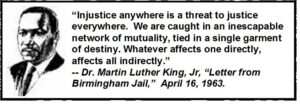
Moreover, I am cognizant of the interrelatedness of all communities and states. I cannot sit idly by in Atlanta and not be concerned about what happens in Birmingham. Injustice anywhere is a threat to justice everywhere. We are caught in an inescapable network of mutuality, tied in a single garment of destiny. Whatever affects one directly affects all indirectly. Never again can we afford to live with the narrow, provincial “outside agitator” idea. Anyone who lives inside the United States can never be considered an outsider.
You deplore the demonstrations that are presently taking place in Birmingham. But I am sorry that your statement did not express a similar concern for the conditions that brought the demonstrations into being. I am sure that each of you would want to go beyond the superficial social analyst who looks merely at effects and does not grapple with underlying causes. I would not hesitate to say that it is unfortunate that so-called demonstrations are taking place in Birmingham at this time, but I would say in more emphatic terms that it is even more unfortunate that the white power structure of this city left the Negro community with no other alternative.
In any nonviolent campaign there are four basic steps: collection of the facts to determine whether injustices are alive, negotiation, self-purification, and direct action. We have gone through all of these steps in Birmingham. There can be no gainsaying of the fact that racial injustice engulfs this community. Birmingham is probably the most thoroughly segregated city in the United States. Its ugly record of police brutality is known in every section of this country. Its unjust treatment of Negroes in the courts is a notorious reality. There have been more unsolved bombings of Negro homes and churches in Birmingham than in any other city in this nation. These are the hard, brutal, and unbelievable facts. On the basis of them, Negro leaders sought to negotiate with the city fathers. But the political leaders consistently refused to engage in good-faith negotiation.
Then came the opportunity last September to talk with some of the leaders of the economic community. In these negotiating sessions certain promises were made by the merchants, such as the promise to remove the humiliating racial signs from the stores. On the basis of these promises, Reverend Shuttlesworth and the leaders of the Alabama Christian Movement for Human Rights agreed to call a moratorium on any type of demonstration. As the weeks and months unfolded, we realized that we were the victims of a broken promise. The signs remained. As in so many experiences of the past, we were confronted with blasted hopes, and the dark shadow of a deep disappointment settled upon us. So we had no alternative except that of preparing for direct action, whereby we would present our very bodies as a means of laying our case before the conscience of the local and national community. We were not unmindful of the difficulties involved. So we decided to go through a process of self-purification. We started having workshops on nonviolence and repeatedly asked ourselves the questions, “Are you able to accept blows without retaliating?” and “Are you able to endure the ordeals of jail?” We decided to set our direct-action program around the Easter season, realizing that, with exception of Christmas, this was the largest shopping period of the year. Knowing that a strong economic withdrawal program would be the by-product of direct action, we felt that this was the best time to bring pressure on the merchants for the needed changes. Then it occurred to us that the March election was ahead, and so we speedily decided to postpone action until after election day. When we discovered that Mr. Conner was in the runoff, we decided again to postpone action so that the demonstration could not be used to cloud the issues. At this time we agreed to begin our nonviolent witness the day after the runoff.
This reveals that we did not move irresponsibly into direct action. We, too, wanted to see Mr. Conner defeated, so we went through postponement after postponement to aid in this community need. After this we felt that direct action could be delayed no longer.
You may well ask, “Why direct action, why sit-ins, marches, and so forth? Isn’t negotiation a better path?” You are exactly right in your call for negotiation. Indeed, this is the purpose of direct action. Nonviolent direct action seeks to create such a crisis and establish such creative tension that a community that has consistently refused to negotiate is forced to confront the issue. It seeks so to dramatize the issue that it can no longer be ignored. I just referred to the creation of tension as a part of the work of the nonviolent resister. This may sound rather shocking. But I must confess that I am not afraid of the word “tension.” I have earnestly worked and preached against violent tension, but there is a type of constructive nonviolent tension that is necessary for growth. Just as Socrates felt that it was necessary to create a tension in the mind so that individuals could rise from the bondage of myths and half-truths to the unfettered realm of creative analysis and objective appraisal, we must see the need of having nonviolent gadflies to create the kind of tension in society that will help men to rise from the dark depths of prejudice and racism to the majestic heights of understanding and brotherhood. So, the purpose of direct action is to create a situation so crisis-packed that it will inevitably open the door to negotiation. We therefore concur with you in your call for negotiation. Too long has our beloved Southland been bogged down in the tragic attempt to live in monologue rather than dialogue.
One of the basic points in your statement is that our acts are untimely. Some have asked, “Why didn’t you give the new administration time to act?” The only answer that I can give to this inquiry is that the new administration must be prodded about as much as the outgoing one before it acts. We will be sadly mistaken if we feel that the election of Mr. Boutwell will bring the millennium to Birmingham. While Mr. Boutwell is much more articulate and gentle than Mr. Conner, they are both segregationists, dedicated to the task of maintaining the status quo. The hope I see in Mr. Boutwell is that he will be reasonable enough to see the futility of massive resistance to desegregation. But he will not see this without pressure from the devotees of civil rights. My friends, I must say to you that we have not made a single gain in civil rights without determined legal and nonviolent pressure. History is the long and tragic story of the fact that privileged groups seldom give up their privileges voluntarily. Individuals may see the moral light and voluntarily give up their unjust posture; but, as Reinhold Niebuhr has reminded us, groups are more immoral than individuals.
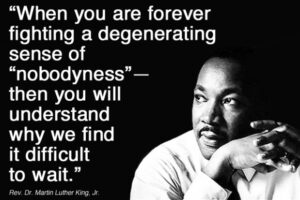
We know through painful experience that freedom is never voluntarily given by the oppressor; it must be demanded by the oppressed. Frankly, I have never yet engaged in a direct-action movement that was “well timed” according to the timetable of those who have not suffered unduly from the disease of segregation. For years now I have heard the word “wait.” It rings in the ear of every Negro with a piercing familiarity. This “wait” has almost always meant “never.” It has been a tranquilizing thalidomide, relieving the emotional stress for a moment, only to give birth to an ill-formed infant of frustration. We must come to see with the distinguished jurist of yesterday that “justice too long delayed is justice denied.” We have waited for more than three hundred and forty years for our God-given and constitutional rights. The nations of Asia and Africa are moving with jetlike speed toward the goal of political independence, and we still creep at horse-and-buggy pace toward the gaining of a cup of coffee at a lunch counter. I guess it is easy for those who have never felt the stinging darts of segregation to say “wait.” But when you have seen vicious mobs lynch your mothers and fathers at will and drown your sisters and brothers at whim; when you have seen hate-filled policemen curse, kick, brutalize, and even kill your black brothers and sisters with impunity; when you see the vast majority of your twenty million Negro brothers smothering in an airtight cage of poverty in the midst of an affluent society; when you suddenly find your tongue twisted and your speech stammering as you seek to explain to your six-year-old daughter why she cannot go to the public amusement park that has just been advertised on television, and see tears welling up in her little eyes when she is told that Funtown is closed to colored children, and see the depressing clouds of inferiority begin to form in her little mental sky, and see her begin to distort her little personality by unconsciously developing a bitterness toward white people; when you have to concoct an answer for a five-year-old son asking in agonizing pathos, “Daddy, why do white people treat colored people so mean?”; when you take a cross-country drive and find it necessary to sleep night after night in the uncomfortable corners of your automobile because no motel will accept you; when you are humiliated day in and day out by nagging signs reading “white” and “colored”; when your first name becomes “nigger” and your middle name becomes “boy” (however old you are) and your last name becomes “John,” and when your wife and mother are never given the respected title “Mrs.”; when you are harried by day and haunted by night by the fact that you are a Negro, living constantly at tiptoe stance, never knowing what to expect next, and plagued with inner fears and outer resentments; when you are forever fighting a degenerating sense of “nobodyness” — then you will understand why we find it difficult to wait. There comes a time when the cup of endurance runs over and men are no longer willing to be plunged into an abyss of injustice where they experience the bleakness of corroding despair. I hope, sirs, you can understand our legitimate and unavoidable impatience.
You express a great deal of anxiety over our willingness to break laws. This is certainly a legitimate concern. Since we so diligently urge people to obey the Supreme Court’s decision of 1954 outlawing segregation in the public schools, it is rather strange and paradoxical to find us consciously breaking laws. One may well ask, “How can you advocate breaking some laws and obeying others?” The answer is found in the fact that there are two types of laws: there are just laws, and there are unjust laws. I would agree with St. Augustine that “An unjust law is no law at all.”
Now, what is the difference between the two? How does one determine when a law is just or unjust? A just law is a man-made code that squares with the moral law, or the law of God. An unjust law is a code that is out of harmony with the moral law. To put it in the terms of St. Thomas Aquinas, an unjust law is a human law that is not rooted in eternal and natural law. Any law that uplifts human personality is just. Any law that degrades human personality is unjust. All segregation statutes are unjust because segregation distorts the soul and damages the personality. It gives the segregator a false sense of superiority and the segregated a false sense of inferiority. To use the words of Martin Buber, the great Jewish philosopher, segregation substitutes an “I – it” relationship for the “I – thou” relationship and ends up relegating persons to the status of things. So segregation is not only politically, economically, and sociologically unsound, but it is morally wrong and sinful. Paul Tillich has said that sin is separation. Isn’t segregation an existential expression of man’s tragic separation, an expression of his awful estrangement, his terrible sinfulness? So I can urge men to obey the 1954 decision of the Supreme Court because it is morally right, and I can urge them to disobey segregation ordinances because they are morally wrong.
Let us turn to a more concrete example of just and unjust laws. An unjust law is a code that a majority inflicts on a minority that is not binding on itself. This is difference made legal. On the other hand, a just law is a code that a majority compels a minority to follow, and that it is willing to follow itself. This is sameness made legal.
Let me give another explanation. An unjust law is a code inflicted upon a minority which that minority had no part in enacting or creating because it did not have the unhampered right to vote. Who can say that the legislature of Alabama which set up the segregation laws was democratically elected? Throughout the state of Alabama all types of conniving methods are used to prevent Negroes from becoming registered voters, and there are some counties without a single Negro registered to vote, despite the fact that the Negroes constitute a majority of the population. Can any law set up in such a state be considered democratically structured?
These are just a few examples of unjust and just laws. There are some instances when a law is just on its face and unjust in its application. For instance, I was arrested Friday on a charge of parading without a permit. Now, there is nothing wrong with an ordinance which requires a permit for a parade, but when the ordinance is used to preserve segregation and to deny citizens the First Amendment privilege of peaceful assembly and peaceful protest, then it becomes unjust.
Of course, there is nothing new about this kind of civil disobedience. It was seen sublimely in the refusal of Shadrach, Meshach, and Abednego to obey the laws of Nebuchadnezzar because a higher moral law was involved. It was practiced superbly by the early Christians, who were willing to face hungry lions and the excruciating pain of chopping blocks before submitting to certain unjust laws of the Roman Empire. To a degree, academic freedom is a reality today because Socrates practiced civil disobedience.

We can never forget that everything Hitler did in Germany was “legal” and everything the Hungarian freedom fighters did in Hungary was “illegal.” It was “illegal” to aid and comfort a Jew in Hitler’s Germany. But I am sure that if I had lived in Germany during that time, I would have aided and comforted my Jewish brothers even though it was illegal. If I lived in a Communist country today where certain principles dear to the Christian faith are suppressed, I believe I would openly advocate is obeying these anti-religious laws.
I must make two honest confessions to you, my Christian and Jewish brothers. First, I must confess that over the last few years I have been gravely disappointed with the white moderate. I have almost reached the regrettable conclusion that the Negro’s great stumbling block in the stride toward freedom is not the White Citizens Councillor or the Ku Klux Klanner but the white moderate who is more devoted to order than to justice; who prefers a negative peace which is the absence of tension to a positive peace which is the presence of justice; who constantly says, “I agree with you in the goal you seek, but I can’t agree with your methods of direct action”; who paternalistically feels that he can set the timetable for another man’s freedom; who lives by the myth of time; and who constantly advises the Negro to wait until a “more convenient season.” Shallow understanding from people of good will is more frustrating than absolute misunderstanding from people of ill will. Lukewarm acceptance is much more bewildering than outright rejection.
In your statement you asserted that our actions, even though peaceful, must be condemned because they precipitate violence. But can this assertion be logically made? Isn’t this like condemning the robbed man because his possession of money precipitated the evil act of robbery? Isn’t this like condemning Socrates because his unswerving commitment to truth and his philosophical delvings precipitated the misguided popular mind to make him drink the hemlock? Isn’t this like condemning Jesus because His unique God-consciousness and never-ceasing devotion to His will precipitated the evil act of crucifixion? We must come to see, as federal courts have consistently affirmed, that it is immoral to urge an individual to withdraw his efforts to gain his basic constitutional rights because the quest precipitates violence. Society must protect the robbed and punish the robber.

I had also hoped that the white moderate would reject the myth of time. I received a letter this morning from a white brother in Texas which said, “All Christians know that the colored people will receive equal rights eventually, but is it possible that you are in too great of a religious hurry? It has taken Christianity almost 2000 years to accomplish what it has. The teachings of Christ take time to come to earth.” All that is said here grows out of a tragic misconception of time. It is the strangely irrational notion that there is something in the very flow of time that will inevitably cure all ills. Actually, time is neutral. It can be used either destructively or constructively. I am coming to feel that the people of ill will have used time much more effectively than the people of good will. We will have to repent in this generation not merely for the vitriolic words and actions of the bad people but for the appalling silence of the good people. We must come to see that human progress never rolls in on wheels of inevitability. It comes through the tireless efforts and persistent work of men willing to be coworkers with God, and without this hard work time itself becomes an ally of the forces of social stagnation.
You spoke of our activity in Birmingham as extreme. At first I was rather disappointed that fellow clergymen would see my nonviolent efforts as those of an extremist. I started thinking about the fact that I stand in the middle of two opposing forces in the Negro community. One is a force of complacency made up of Negroes who, as a result of long years of oppression, have been so completely drained of self-respect and a sense of “somebodyness” that they have adjusted to segregation, and, on the other hand, of a few Negroes in the middle class who, because of a degree of academic and economic security and because at points they profit by segregation, have unconsciously become insensitive to the problems of the masses. The other force is one of bitterness and hatred and comes perilously close to advocating violence. It is expressed in the various black nationalist groups that are springing up over the nation, the largest and best known being Elijah Muhammad’s Muslim movement. This movement is nourished by the contemporary frustration over the continued existence of racial discrimination. It is made up of people who have lost faith in America, who have absolutely repudiated Christianity, and who have concluded that the white man is an incurable devil. I have tried to stand between these two forces, saying that we need not follow the do-nothingism of the complacent or the hatred and despair of the black nationalist. There is a more excellent way, of love and nonviolent protest. I’m grateful to God that, through the Negro church, the dimension of nonviolence entered our struggle. If this philosophy had not emerged, I am convinced that by now many streets of the South would be flowing with floods of blood. And I am further convinced that if our white brothers dismiss as “rabble-rousers” and “outside agitators” those of us who are working through the channels of nonviolent direct action and refuse to support our nonviolent efforts, millions of Negroes, out of frustration and despair, will seek solace and security in black nationalist ideologies, a development that will lead inevitably to a frightening racial nightmare.
Oppressed people cannot remain oppressed forever. The urge for freedom will eventually come. This is what has happened to the American Negro. Something within has reminded him of his birthright of freedom; something without has reminded him that he can gain it. Consciously and unconsciously, he has been swept in by what the Germans call the Zeitgeist, and with his black brothers of Africa and his brown and yellow brothers of Asia, South America, and the Caribbean, he is moving with a sense of cosmic urgency toward the promised land of racial justice. Recognizing this vital urge that has engulfed the Negro community, one should readily understand public demonstrations. The Negro has many pent-up resentments and latent frustrations. He has to get them out. So let him march sometime; let him have his prayer pilgrimages to the city hall; understand why he must have sitins and freedom rides. If his repressed emotions do not come out in these nonviolent ways, they will come out in ominous expressions of violence. This is not a threat; it is a fact of history. So I have not said to my people, “Get rid of your discontent.” But I have tried to say that this normal and healthy discontent can be channeled through the creative outlet of nonviolent direct action. Now this approach is being dismissed as extremist. I must admit that I was initially disappointed in being so categorized.
But as I continued to think about the matter, I gradually gained a bit of satisfaction from being considered an extremist. Was not Jesus an extremist in love? — “Love your enemies, bless them that curse you, pray for them that despitefully use you.” Was not Amos an extremist for justice? — “Let justice roll down like waters and righteousness like a mighty stream.” Was not Paul an extremist for the gospel of Jesus Christ? — “I bear in my body the marks of the Lord Jesus.” Was not Martin Luther an extremist? — “Here I stand; I can do no other so help me God.” Was not John Bunyan an extremist? — “I will stay in jail to the end of my days before I make a mockery of my conscience.” Was not Abraham Lincoln an extremist? — “This nation cannot survive half slave and half free.” Was not Thomas Jefferson an extremist? — “We hold these truths to be self-evident, that all men are created equal.” So the question is not whether we will be extremist, but what kind of extremists we will be. Will we be extremists for hate, or will we be extremists for love? Will we be extremists for the preservation of injustice, or will we be extremists for the cause of justice?
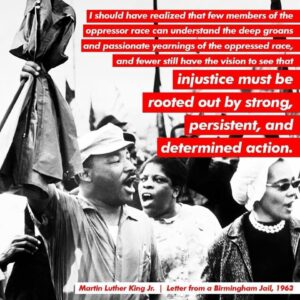
I had hoped that the white moderate would see this. Maybe I was too optimistic. Maybe I expected too much. I guess I should have realized that few members of a race that has oppressed another race can understand or appreciate the deep groans and passionate yearnings of those that have been oppressed, and still fewer have the vision to see that injustice must be rooted out by strong, persistent, and determined action. I am thankful, however, that some of our white brothers have grasped the meaning of this social revolution and committed themselves to it. They are still all too small in quantity, but they are big in quality. Some, like Ralph McGill, Lillian Smith, Harry Golden, and James Dabbs, have written about our struggle in eloquent, prophetic, and understanding terms. Others have marched with us down nameless streets of the South. They sat in with us at lunch counters and rode in with us on the freedom rides. They have languished in filthy roach-infested jails, suffering the abuse and brutality of angry policemen who see them as “dirty nigger lovers.” They, unlike many of their moderate brothers, have recognized the urgency of the moment and sensed the need for powerful “action” antidotes to combat the disease of segregation.
Let me rush on to mention my other disappointment. I have been disappointed with the white church and its leadership. Of course, there are some notable exceptions. I am not unmindful of the fact that each of you has taken some significant stands on this issue. I commend you, Reverend Stallings, for your Christian stand this past Sunday in welcoming Negroes to your Baptist Church worship service on a nonsegregated basis. I commend the Catholic leaders of this state for integrating Springhill College several years ago.
But despite these notable exceptions, I must honestly reiterate that I have been disappointed with the church. I do not say that as one of those negative critics who can always find something wrong with the church. I say it as a minister of the gospel who loves the church, who was nurtured in its bosom, who has been sustained by its Spiritual blessings, and who will remain true to it as long as the cord of life shall lengthen.
I had the strange feeling when I was suddenly catapulted into the leadership of the bus protest in Montgomery several years ago that we would have the support of the white church. I felt that the white ministers, priests, and rabbis of the South would be some of our strongest allies. Instead, some few have been outright opponents, refusing to understand the freedom movement and misrepresenting its leaders; all too many others have been more cautious than courageous and have remained silent behind the anesthetizing security of stained-glass windows.
In spite of my shattered dreams of the past, I came to Birmingham with the hope that the white religious leadership of this community would see the justice of our cause and with deep moral concern serve as the channel through which our just grievances could get to the power structure. I had hoped that each of you would understand. But again I have been disappointed.
I have heard numerous religious leaders of the South call upon their worshipers to comply with a desegregation decision because it is the law, but I have longed to hear white ministers say, follow this decree because integration is morally right and the Negro is your brother. In the midst of blatant injustices inflicted upon the Negro, I have watched white churches stand on the sidelines and merely mouth pious irrelevancies and sanctimonious trivialities. In the midst of a mighty struggle to rid our nation of racial and economic injustice, I have heard so many ministers say, “Those are social issues which the gospel has nothing to do with,” and I have watched so many churches commit themselves to a completely otherworldly religion which made a strange distinction between bodies and souls, the sacred and the secular.
There was a time when the church was very powerful. It was during that period that the early Christians rejoiced when they were deemed worthy to suffer for what they believed. In those days the church was not merely a thermometer that recorded the ideas and principles of popular opinion; it was the thermostat that transformed the mores of society. Wherever the early Christians entered a town the power structure got disturbed and immediately sought to convict them for being “disturbers of the peace” and “outside agitators.” But they went on with the conviction that they were “a colony of heaven” and had to obey God rather than man. They were small in number but big in commitment. They were too God-intoxicated to be “astronomically intimidated.” They brought an end to such ancient evils as infanticide and gladiatorial contest.
Things are different now. The contemporary church is so often a weak, ineffectual voice with an uncertain sound. It is so often the arch supporter of the status quo. Far from being disturbed by the presence of the church, the power structure of the average community is consoled by the church’s often vocal sanction of things as they are.
But the judgment of God is upon the church as never before. If the church of today does not recapture the sacrificial spirit of the early church, it will lose its authentic ring, forfeit the loyalty of millions, and be dismissed as an irrelevant social club with no meaning for the twentieth century. I meet young people every day whose disappointment with the church has risen to outright disgust. I hope the church as a whole will meet the challenge of this decisive hour. But even if the church does not come to the aid of justice, I have no despair about the future. I have no fear about the outcome of our struggle in Birmingham, even if our motives are presently misunderstood. We will reach the goal of freedom in Birmingham and all over the nation, because the goal of America is freedom. Abused and scorned though we may be, our destiny is tied up with the destiny of America. Before the Pilgrims landed at Plymouth, we were here. Before the pen of Jefferson scratched across the pages of history the majestic word of the Declaration of Independence, we were here. For more than two centuries our foreparents labored here without wages; they made cotton king; and they built the homes of their masters in the midst of brutal injustice and shameful humiliation — and yet out of a bottomless vitality our people continue to thrive and develop. If the inexpressible cruelties of slavery could not stop us, the opposition we now face will surely fail. We will win our freedom because the sacred heritage of our nation and the eternal will of God are embodied in our echoing demands.
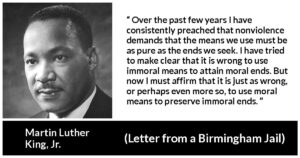
I must close now. But before closing I am impelled to mention one other point in your statement that troubled me profoundly. You warmly commended the Birmingham police force for keeping “order” and “preventing violence.” I don’t believe you would have so warmly commended the police force if you had seen its angry violent dogs literally biting six unarmed, nonviolent Negroes. I don’t believe you would so quickly commend the policemen if you would observe their ugly and inhuman treatment of Negroes here in the city jail; if you would watch them push and curse old Negro women and young Negro girls; if you would see them slap and kick old Negro men and young boys, if you would observe them, as they did on two occasions, refusing to give us food because we wanted to sing our grace together. I’m sorry that I can’t join you in your praise for the police department. It is true that they have been rather disciplined in their public handling of the demonstrators. In this sense they have been publicly “nonviolent.” But for what purpose? To preserve the evil system of segregation. Over the last few years I have consistently preached that nonviolence demands that the means we use must be as pure as the ends we seek. So I have tried to make it clear that it is wrong to use immoral means to attain moral ends. But now I must affirm that it is just as wrong, or even more, to use moral means to preserve immoral ends.
I wish you had commended the Negro demonstrators of Birmingham for their sublime courage, their willingness to suffer, and their amazing discipline in the midst of the most inhuman provocation. One day the South will recognize its real heroes. They will be the James Merediths, courageously and with a majestic sense of purpose facing jeering and hostile mobs and the agonizing loneliness that characterizes the life of the pioneer. They will be old, oppressed, battered Negro women, symbolized in a seventy-two-year-old woman of Montgomery, Alabama, who rose up with a sense of dignity and with her people decided not to ride the segregated buses, and responded to one who inquired about her tiredness with ungrammatical profundity, “My feets is tired, but my soul is rested.” They will be young high school and college students, young ministers of the gospel and a host of their elders courageously and nonviolently sitting in at lunch counters and willingly going to jail for conscience’s sake. One day the South will know that when these disinherited children of God sat down at lunch counters they were in reality standing up for the best in the American dream and the most sacred values in our Judeo-Christian heritage.
Never before have I written a letter this long — or should I say a book? I’m afraid that it is much too long to take your precious time. I can assure you that it would have been much shorter if I had been writing from a comfortable desk, but what else is there to do when you are alone for days in the dull monotony of a narrow jail cell other than write long letters, think strange thoughts, and pray long prayers?
If I have said anything in this letter that is an understatement of the truth and is indicative of an unreasonable impatience, I beg you to forgive me. If I have said anything in this letter that is an overstatement of the truth and is indicative of my having a patience that makes me patient with anything less than brotherhood, I beg God to forgive me.
Yours for the cause of Peace and Brotherhood,
MARTIN LUTHER KING, JR.

 At only 5’2”, Ben Ferencz was not an imposing figure. But during the course of his life, he became a giant in the areas of international criminal law, in prosecuting war crimes, and in the quest for world peace. He died earlier this month (4/7/23) in an assisted living facility in Boynton Beach, FL. He was 103.
At only 5’2”, Ben Ferencz was not an imposing figure. But during the course of his life, he became a giant in the areas of international criminal law, in prosecuting war crimes, and in the quest for world peace. He died earlier this month (4/7/23) in an assisted living facility in Boynton Beach, FL. He was 103.

 It’s sad to say, but mass shootings in the United States have become so common, that it is easy to view them from a distance, to be detached. After all, the shootings happen somewhere else, to someone else. Sure, they’re horrible, but for most of us, they don’t really affect our lives. Until they do.
It’s sad to say, but mass shootings in the United States have become so common, that it is easy to view them from a distance, to be detached. After all, the shootings happen somewhere else, to someone else. Sure, they’re horrible, but for most of us, they don’t really affect our lives. Until they do.
 Back in 2021, I compiled a list of the
Back in 2021, I compiled a list of the  I’ve had sinus issues for years. Since 1995, I’ve had three sinus surgeries, and I’m pretty sure I’m due for another one. Over the past few months, my sinuses have been all stuffed up, and it’s making me constantly dizzy. Trust me, it’s not much fun.
I’ve had sinus issues for years. Since 1995, I’ve had three sinus surgeries, and I’m pretty sure I’m due for another one. Over the past few months, my sinuses have been all stuffed up, and it’s making me constantly dizzy. Trust me, it’s not much fun.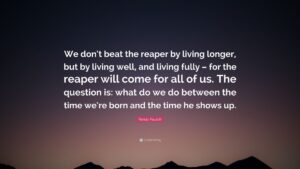 If you had to choose, would you choose more time or more money? I suspect most people would say they’d choose more time. More time to spend with their loved ones. More time to explore the world. More time to pursue hobbies or passions. More time to learn more, do more, see more. And yet, most of us spend the majority of our time pursuing money. Why is that?
If you had to choose, would you choose more time or more money? I suspect most people would say they’d choose more time. More time to spend with their loved ones. More time to explore the world. More time to pursue hobbies or passions. More time to learn more, do more, see more. And yet, most of us spend the majority of our time pursuing money. Why is that? In early April 1963, the civil rights movement, led by the Southern Christian Leadership Conference (SCLC) and it’s co-founder, Martin Luther King, Jr, seemed to be stalled. Despite non-violent protests across the nation, the Kennedy Administration, which had come to power promising civil rights legislation, had seemingly turned a blind eye. They were still supportive, or so it seemed, but they weren’t doing much to fulfill their promise.
In early April 1963, the civil rights movement, led by the Southern Christian Leadership Conference (SCLC) and it’s co-founder, Martin Luther King, Jr, seemed to be stalled. Despite non-violent protests across the nation, the Kennedy Administration, which had come to power promising civil rights legislation, had seemingly turned a blind eye. They were still supportive, or so it seemed, but they weren’t doing much to fulfill their promise.





 I’m sure you’ve heard it said that for maximum health benefits and weight loss, you should walk 10,000 steps per day. But is that really true? Probably not. In the very least, it’s not based on science.
I’m sure you’ve heard it said that for maximum health benefits and weight loss, you should walk 10,000 steps per day. But is that really true? Probably not. In the very least, it’s not based on science.